What’s new for the Greek life on campus? Because of different movies, shows and news stories, some students might be wary of joining sororities and fraternities; they think there will be some form of hazing or that they will be viewed differently by their peers.
However, Jose Moreno, assistant dean of students for conduct and greek affairs and Shepherd Graduates is putting in an effort to make Shepherd Greek life a positive and engaging opportunity for all students.
Moreno graduated from Shepherd in May of 2013 with his Masters in college student development and administration. For his undergraduate degree, Moreno attended Framingham State University, but he came to Shepherd in 2011.
Moreno was initially attracted to Shepherd by the affordability and proximity to D.C., but was taken by its close sense of community, “hence why I’m still here,” he said.
When Moreno was a graduate student, he attended classes taught by Drs. Stevens, Adams and Segar. Moreno said he loved working with these professors and helped him immensely to progress toward what he wanted to do.
He was a grad assistant for student conduct after 2011 and is now the assistant dean of students for student conduct and Greek affairs.
Besides these responsibilities, Moreno also helps with student orientation, advisement and registration, and the Washington Gateway Academy.
Moreno said the biggest difference for him between being a college student and being a college administrator is just getting to know the way things work in a new environment.
When he first started out as a graduate assistant, he had to adjust to working for the system, but by now, Moreno is used to Shepherd’s way of doing things.
He tries not to forget what it was like to be an undergraduate student, especially when he is talking to undergrads. Moreno feels letting students know that you shared the same experiences with them allows you to create a bond with them.
Moreno’s job is intertwined with the eight sororities and fraternities on campus. Working with his graduate assistant Alexander Haslacker, Moreno advises and guides the Greek students as well as enforces recruitment rules and helps plan programs. One of Moreno’s many additions to the Greek program is a Recognition Banquet for the sororities and fraternities that will be held this spring.
Moreno’s assistant Haslacker is in the same program Moreno was in a year ago. However, he plans to move on to another university after he graduates this May.
In the mean time, Haslacker works alongside Moreno cleaning up the mismanagement and neglect that pervaded Greek life in years past.
Their goals, Haslacker says, are to open up to Shepherd as a whole and get reconnected to the community.
At the top of Moreno’s list of goals for Greek life are expansion and growth. Moreno said that only about 3.6 percent of Shepherd’s population are a part of Greek life.
This statistic is quite low compared to the average for schools this size: 10 percent. But the large margin doesn’t faze Moreno who appreciates that the gap gives Shepherd Greek life a good chance to grow at a natural pace.
To reach his lofty goals, Moreno is working closely with the sororities and fraternities to change their mindsets and put ownership on them. He encourages them to create programs and activities that include and engage the entire Shepherd community.
“We want to get their names out there,” he said. “We want growth and recognition from staff, faculty and other students.”
Moreno also puts a focus on philanthropic work. He wants outside organizations to think of the Shepherd sororities and fraternities when they need help for community service. Service and education are first in the Greek chapters on campus, and local and national rules alike are strictly followed.
In spite of so much honest and generous work by the students in the sororities and fraternities and by Moreno himself, Greek life still has a bad reputation.
However, these stereotypes, according to Moreno, are all national, not local. When one scandalous event happens in one of the huge universities in America, the media portrays all Greek groups as wicked. Movies like “Animal House” also paint a dirtier picture of these clubs than reality.
“While we can’t control national media,” Moreno said, “we can put Shepherd’s groups in a positive light.” Shepherd’s sororities and fraternities actually have very few issues, likely because the school is, in itself, a small community.
Every semester, he and Haslacker hold anti-hazing seminars that go over Shepherd’s anti-hazing policy and the history and traditions of hazing. Grad student Haslacker teaches these seminars, making them interactive and engaging. Any student may attend for free, but all Greek members must go at least once a year.
Haslacker says,“He’s really the best person they could have for the position.” Hopefully these changes and plans will get more students interested and excited about joining Greek life.

Leave a Reply